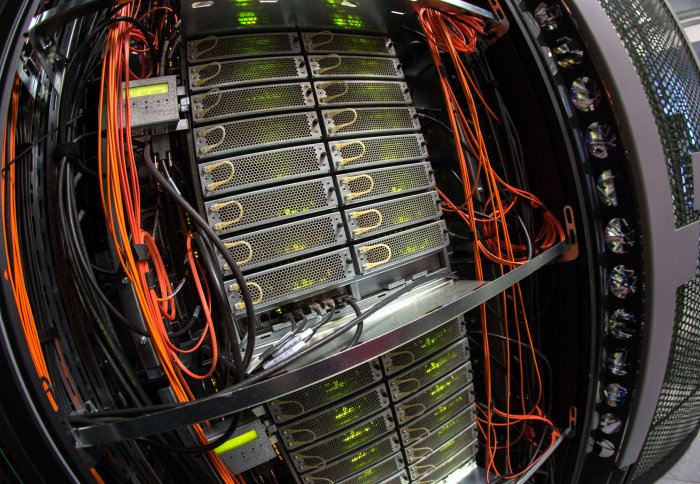“High performance computing is part of our vital research infrastructure”

Imperial has invested £15m to support the expansion of the Research Computing Service.
High performance computing (HPC) is fast confirming its place as a vital tool for researchers at the College. It allows individual computers to work together to analyse data that is too large for a single desktop to handle.
The investment we’ve made means that we have a largest active user community and one of the largest facilities of any UK university Professor Nick Jennings Vice-Provost (Research and Enterprise)
Imperial’s Research Computing Service provides access to powerful computing resources, expert consultancy and training for all researchers. Over 1,800 staff and postgraduate students across the College have used the service over the past year, supported by a team of software engineers, specialist trainers and systems analysts.
The number of staff and students using the service has increased by 35 per cent over the past two years. Advances in areas such as machine learning, electronic records and genomics have led to an increase in registered users from the Faculty of Medicine and the Business School in particular.
 Professor Nick Jennings, Imperial’s Vice-Provost for Research and Enterprise, has championed the need for central institutional support for the service. He said: “We often think of infrastructure in terms of buildings and labs, but in the modern world high performance computing is part of the vital infrastructure that underpins our research.
Professor Nick Jennings, Imperial’s Vice-Provost for Research and Enterprise, has championed the need for central institutional support for the service. He said: “We often think of infrastructure in terms of buildings and labs, but in the modern world high performance computing is part of the vital infrastructure that underpins our research.
“Access to high capacity computing resources is increasingly vital across growing and emerging research areas such as machine learning and genomics. The investment we’ve made means that we have a largest active user community and one of the largest facilities of any UK university.”
Imperial has committed to an ongoing investment of £3 million per year to expand the service to meet demand, and to keep it free at the point of use for researchers.
 Professor Spencer Sherwin, Director of the Research Computing Service, said: “Different disciplines value different aspects of our service. We’re tailoring it to meet this range of needs, not only in terms of the actual hardware and software, but also in the support and training we offer.”
Professor Spencer Sherwin, Director of the Research Computing Service, said: “Different disciplines value different aspects of our service. We’re tailoring it to meet this range of needs, not only in terms of the actual hardware and software, but also in the support and training we offer.”
Below we hear from three regular users of the service.
Dr David Orme, Research Fellow, Department of Life Sciences
Dr Orme works on species diversity and uses computer models to explore spatial data – like species’ range maps.
He said: “Ecological research using ‘big data’ is becoming more common. An individual researcher might be able to afford one powerful workstation, but computing resources are then the bottleneck in research. The Research Computing Service allows us to get answers much more quickly and provides the power to solve difficult problems but, probably more importantly, also makes it possible to do more data exploration and more careful research.”
Dr Kim Jelfs, Senior Lecturer, Department of Chemistry
 Dr Jelfs uses computational approaches to enable the discovery of functional molecular materials.
Dr Jelfs uses computational approaches to enable the discovery of functional molecular materials.
She said: “Every member of my group uses the Research Computing Service on a daily basis to run computationally intensive calculations. Not only do we need to run parallel calculations, but my group’s research is also focused upon high throughput screening, where we need to run tens of thousands of calculations to screen candidate materials before we analyse them for functionality.”
Dr Antonio Berlanga-Taylor, Research Fellow, School of Public Health
Dr Berlanga-Taylor studies the interaction of our genes and the environment in disease development.
He said: “Genomics simply wouldn’t exist without research computing resources such as those provided by Imperial. I study large cohorts with multiple measurements that amount to hundreds of millions of observations. Answering research questions based on these data requires not only high performance computing but also data storage alongside the expertise and person-power that the Service provides.”
Article text (excluding photos or graphics) © Imperial College London.
Photos and graphics subject to third party copyright used with permission or © Imperial College London.
Reporter
Elizabeth Nixon
Communications Division